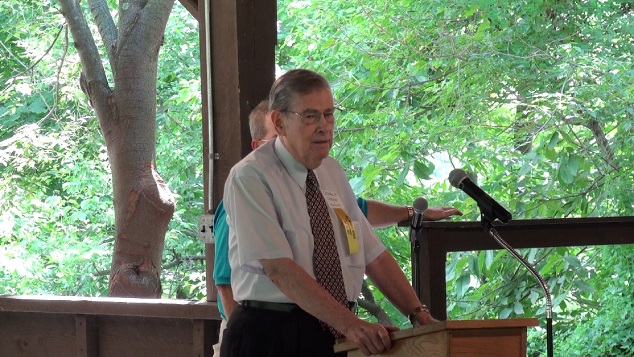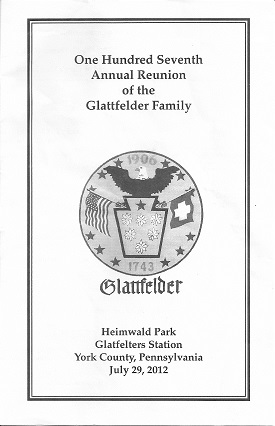Glattfelders in the War of 1812
The 2012 reunion was held July 28 and 29 at Heimwald Park, on a beautiful summer days. On Saturday we enjoyed our normal picnic meal of Sechrist's Hot Dogs with all the fixin's (111 people partook) and music by the Brodbeck's Band. On Sunday 108 adults and three children enjoyed chicken dinners, and two vegetarian meals were enjoyed. The program followed.
Our theme for the 107th Reunion was Glattfelders in the War of 1812
War of 1812 Glattfelders
The following text has been adapted from remarks delivered by Historian Emeritus Dr. Charles H. Glatfelter at the reunion in July:
We have perhaps heard it said many times in the past and we may have learned in school many years ago that the United States of America is a citadel of liberty which should have as little as possible to do with the affairs and problems of Europe. But our teachers and their books may have told us something which, at best, was only partly true.
It is only when we begin to dig more deeply into the good evidence that is available, and so easy to ignore, that we begin to understand the 13 colonies in British North America came into existence as the French and British were vying with each other for dominance in Europe. What we were taught in school was something called the inter-colonial wars, beginning in 1689, was in fact the involvement of the British colonies on the east coast of North America in the Anglo-French rivalry.
Once our revolution began, the Americans soon decided that French assistance, military and other, was absolutely needed for American victory. The French were eager to oblige.
The cost of French financial and other help to the Americans certainly helped precipitate the French revolution, which began only a few months after George Washington became president of the United States. Within a few years, Britain and France were actually at war again. Except for several lulls in the fighting, it lasted until 1814.
American presidents tried to prevent this country from becoming involved, but the British and French attacks on vital American shipping and other violations of its neutral rights led Congress to declare war on Britain in 1812.
The United States was woefully unprepared for war. There were some American victories at sea, but few on land. By March 1814, the allied armies against Napoleon entered Paris and forced him to abdicate. This victory prompted the British to turn their full attention to the Americans, in the hope they could finally put this upstart nation in its place. They hoped to move against Lake Champlain, the Chesapeake Bay and New Orleans.
In August 1814, a British army entered the Chesapeake Bay. On August 24, it seized and burned Washington. Three weeks later, on September 13, it began to bombard Fort McHenry. Not succeeding, a month later, the British left the bay and headed for Jamaica. On December 24, 1814, a treaty signed at Ghent ended the war.
From time to time during the war, Pennsylvania residents joined units formed by enlistment or draft to fight the British on American soil. When the British forces entered the Chesapeake Bay in August 1814, units were formed in York, Adams and neighboring counties to repel them.
Thus far, we have found only one Glatfelter among the veterans of this war. His name was Daniel Glatfelter (1796-1880). In his pension application, he stated that he was drafted into a Pennsylvania militia regiment on or about October 29, 1814, marched to York and mustered into service on the York common. Although his term of service was six months, he was honorably discharged on November 20, 1814. The assault on Fort McHenry had occurred two months before and the British were apparently leaving, but Daniel was told to be ready “if his services were farther wanted.” It turned out that they were not.
Years later, Daniel applied for bounty land, which if he received, he did not keep. In 1878, he was awarded a monthly pension of $8.
Drafted when he was 18, he married Catherine Kling (1796-1872) in 1818. They were the parents of 10 children born between 1820 and 1838. Most of them remained in York County. They married into Miller, Fishel, Messersmith, Mummert, Folkemer, Eyster and Wiest families.
Reporting on his death in its issue of January 21, 1881, the Glen Rock Item stated that he had 43 grandchildren and 51 great-grandchildren, and also that he “was drafted into the U.S. service in the War of 1812, and was a pensioner at the time of his death.”
Daniel Glatfelter was a son of Henry Glatfelter (1752-1833) and a grandson of Casper Glattfelder (1709- 1775).




